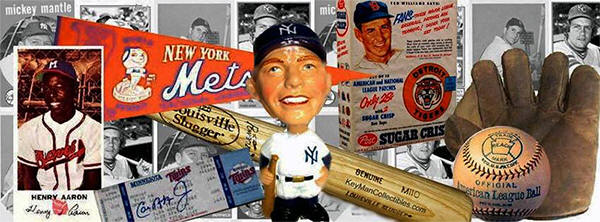|
|
|
|
| KeyMan
Collectibles |
NEWSLETTER |
January 2020 |
|
|
Base Ball Score Books Scorecards and Programs |
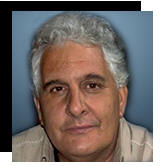 |
|
Steven KeyMan |
|
|
Keeping Score -
By Steven KeyMan |
|
Founder of
Keymancollectibles.com,
and a long time
collector, Steven
KeyMan has more than 30
years of experience in
researching, and
cataloging information
on Baseball
Memorabilia.
Researching his own personal
collection, and helping others find
information on their
collectibles, the
website grew into the
largest online resource
for baseball
memorabilia |
|
|
|
|
|
| |
Ask
Steven: Direct your questions or feedback,
about Baseball Memorabilia to Steven KeyMan
Steve@keymancollectibles.com You can also Send
KeyMan pictures of your personal Memorabilia Display,
and get your own Free
Collectors Showcase Room featured on the website.. |
|
|
|
|
| |
In the earliest days of baseball it
was the responsibility of each club to
have its own appointed scorer, who
fully understood every point of the
game. A person of sufficient power of
observation to note down correctly the
details of every innings of the game. A
sample of a printed form of a
score-book that was general adopted by
clubs at the time appeared in the 1862 issue f the
"Dime Base-Ball Player" with the
following instructions:
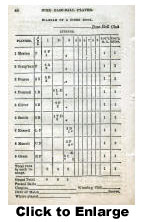 "It will be observed that each player
is numbered on the score, from one to
nine, and his position, in this
respect, and also in reference to that
he holds in the field, remains
unchanged on the book throughout the
game, no matter how many times his
position is changed as a fielder.
Therefore, instead of writing the name
of the player we wish to designate, we
simply use the figure that precedes his
name.
"It will be observed that each player
is numbered on the score, from one to
nine, and his position, in this
respect, and also in reference to that
he holds in the field, remains
unchanged on the book throughout the
game, no matter how many times his
position is changed as a fielder.
Therefore, instead of writing the name
of the player we wish to designate, we
simply use the figure that precedes his
name.
In order to record the movements of
each player during the game, a series
of abbreviations are adopted, those we
use in scoring being as follows:"
|
|
| |
A for
first base.
B for second base.
C for third base.
H for home base.
F for catch on the fly |
D for catch on the bound.
L for foul balls.
T for tips.
K for struke out.
R for run out between bases. |
|
Double letters - |
HR or hr, for home
runs.
LF for foul ball on the
bound.
LD for foul ball on the
bound.
TF for foul tip on the
fly.
TD for foul tip on the
bound. |
|
|
|
| |
|
| |
SPALDING'S SCORE BOOK |
| |
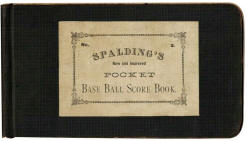 Spalding's
new design Pocket and Club Score Books
were first brought out in 1877. They
were adapted for the spectator of ball
games, who scores for his own
amusement, as well as the official club
scorer, who records the minutest
detail.
Spalding's
new design Pocket and Club Score Books
were first brought out in 1877. They
were adapted for the spectator of ball
games, who scores for his own
amusement, as well as the official club
scorer, who records the minutest
detail.
By this new system, the art of
scoring can be acquired in a single
game. Full instructions, with the
latest League rules, accompany each
book. |
| |
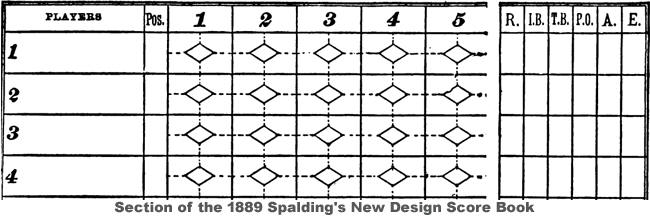 |
|
| |
 Harry
M. Steven founder HMS Inc., "Caterers
To The Sporting World" is noted for
inventing the scorecard and Hot Dog. In
1885 Stevens found himself without a
job, as a result of a strike at a steel
mill. He became a book salesman, and
bored with his job, he decided to go
the a ball game in Columbus, Ohio. Harry
M. Steven founder HMS Inc., "Caterers
To The Sporting World" is noted for
inventing the scorecard and Hot Dog. In
1885 Stevens found himself without a
job, as a result of a strike at a steel
mill. He became a book salesman, and
bored with his job, he decided to go
the a ball game in Columbus, Ohio.
After discovering there was no way of
identifying the players who were
strangers to him, he sought out the
club owner after the game and bought
the rights to put out a program.
Stevens was soon selling his scorecards at the Columbus ballpark. wearing
a distinctive red coat and top hat as
he yelled his sales pitch: “You can’t
tell the players without a scorecard!”
The scorecard he came up with included
an illustration on its front cover and
an advertisement on the back. Inside
had a list of the names and positions
of the players, along with room to
takes notes or keep score.
 The 1912 Ratsch Peerless Official Rule,
Score and Baseball book catalog
featured a complimentary scorecard. It
tells a story that played out at the
opening game of Ty Cobb's famous trip
to Cuba in 1910.....
The 1912 Ratsch Peerless Official Rule,
Score and Baseball book catalog
featured a complimentary scorecard. It
tells a story that played out at the
opening game of Ty Cobb's famous trip
to Cuba in 1910.....
HE PLAYED TY COBB SAFE
- Before Cobb's Arrival in Cuba, the
Cuban players had been fed yarns
concerning him which told of his
wonderful speed. It was said that he
was impossible to catch when stealing a
base, and some of the more
impressionable on the native team
conceived the idea that Tyrus had legs
like a fawn and such things.
 When at length Ty got on first in the
opening game the Cuban players and
spectators watched him with awe.
Suddenly, he started to steal second.
The catcher had the ball. Instead of
throwing it he hung on grimly to the
sphere and Tyrus sailed around the
bags, stopping at third. Later Cobb
scored, and he asked the backstop why
he hadn't thrown the pill. Said the
backstop: "I knew it was impossible to
catch you on the bases so I held it to
keep you from stealing home"
When at length Ty got on first in the
opening game the Cuban players and
spectators watched him with awe.
Suddenly, he started to steal second.
The catcher had the ball. Instead of
throwing it he hung on grimly to the
sphere and Tyrus sailed around the
bags, stopping at third. Later Cobb
scored, and he asked the backstop why
he hadn't thrown the pill. Said the
backstop: "I knew it was impossible to
catch you on the bases so I held it to
keep you from stealing home"
 Baseball-themed fans were the fad
during the early 20th century. Many
were produced as advertising premiums
given away by various businesses with
their ad on the back. This dual purpose
fan keeps the baseball-fan cool while
keeping score of the game. The front
includes two blank score sheets, home
team on the left, visiting team on the
right.
Baseball-themed fans were the fad
during the early 20th century. Many
were produced as advertising premiums
given away by various businesses with
their ad on the back. This dual purpose
fan keeps the baseball-fan cool while
keeping score of the game. The front
includes two blank score sheets, home
team on the left, visiting team on the
right.
The top of this circa 1910 die-cut baseball diamond shape fan features
sepia portraits of sixteen top players
or managers in the game. One from each
of the sixteen Major League clubs. Six
hall of famers include; Bresnahan,
Clarke (misspelled "Clark" on the fan),
Chance, Griffith, Lajoie and Wallace.
In the center is an image of a woman
spectator wearing a hat.
 Most if not all the major sporting good
manufacturers sold score books, and
some sold single game scorecards too.
This Goldsmith score card was
printed as an advertising premium
distributed to sporting good stores
that carried Goldsmith products.
Most if not all the major sporting good
manufacturers sold score books, and
some sold single game scorecards too.
This Goldsmith score card was
printed as an advertising premium
distributed to sporting good stores
that carried Goldsmith products.
The empty space at the bottom of the
front, was reserved for the proprietor
to print business information. As
Stated on the inside scorecard portion;
"These scorecards can be had free of
charge from your Sporting Goods dealer
or from makers of The Goldsmith
Guaranteed Trade Mark Sporting Goods,
on receipt of two cent stamp to pat
postage."
 Most teams used the Victory "V" or
Victory V Eagle design during the war
years from around 1942-1945. More than
just a baseball program, wartime
scorecards document American history.
A constant reminder to "Buy United States War bonds and
stamps" printed throughout.
Reminding people to save cooking fats
for the war effort, (I believe to make
nitro.) They even supply emergency
ballpark air raid evacuation plans.
Most teams used the Victory "V" or
Victory V Eagle design during the war
years from around 1942-1945. More than
just a baseball program, wartime
scorecards document American history.
A constant reminder to "Buy United States War bonds and
stamps" printed throughout.
Reminding people to save cooking fats
for the war effort, (I believe to make
nitro.) They even supply emergency
ballpark air raid evacuation plans.
Featured inside a
1942 NY Yankees scorecard, Mayor La Guardia provides
a system of safety for patrons
attending the games. It goes on to
state: "This park is not bombproof but
as safe as elsewhere. If opposite your
seat you find the label "SIT TIGHT" you
will be expected to do just that during
an air raid....."
 "....If the
label should read FOLLOW GREEN ARROW,
or FOLLOW RED ARROW you will e expected
to comply with these instructions. If
seated in the bleachers follow painted
directional lines to exit. If an alert
is sounded walk to place of safety.
Don't run or shout. Obey the air raid
wardens. PLAY YOUR PART IN THE DEFENCE
GAME. Please comply with these
instructions. They are intended for
your protection."
"....If the
label should read FOLLOW GREEN ARROW,
or FOLLOW RED ARROW you will e expected
to comply with these instructions. If
seated in the bleachers follow painted
directional lines to exit. If an alert
is sounded walk to place of safety.
Don't run or shout. Obey the air raid
wardens. PLAY YOUR PART IN THE DEFENCE
GAME. Please comply with these
instructions. They are intended for
your protection."
 Most wartime (WWII) Minor &
Negro League baseball teams from about
1943-1945, used this patriotic cover
for their scorecards. The great red
White and blue artwork done by the
artist Valentine, features Uncle Sam
swinging a bat, wearing a U.S. cap,
star-spangled vest, and red striped
pants. The red portion at the bottom
featured an American Flag on the left,
the .10 cents price on a baseball to
the right, centered by the name of the
team using the program.
Most wartime (WWII) Minor &
Negro League baseball teams from about
1943-1945, used this patriotic cover
for their scorecards. The great red
White and blue artwork done by the
artist Valentine, features Uncle Sam
swinging a bat, wearing a U.S. cap,
star-spangled vest, and red striped
pants. The red portion at the bottom
featured an American Flag on the left,
the .10 cents price on a baseball to
the right, centered by the name of the
team using the program.
This 1945 Score Book was used by the
"Lucky" Portland BEAVERS, a Double-A
team of the Pacific Coast League. |
|
| |
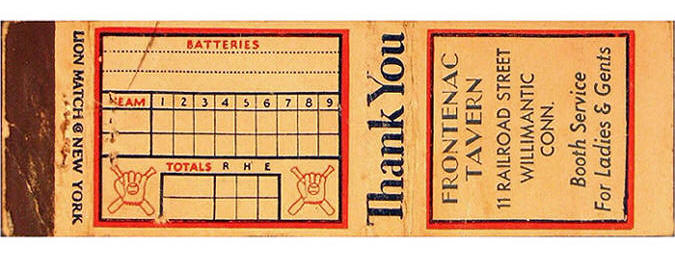 |
|
| |
The marketing power of a
scorecard has no limits. This matchbook
Cover features a Scorecard on the back
panel. At the top of the scorecard are
lines to fill in the Batteries (pitcher
& Catcher) for both teams, followed by
a line score, Runs, Hits, and Error
Totals. The front panel advertisement
is for Frontenac Tavern, located at 11
Railroad Street Willmantic, Conn. "Both
Services For Ladies & Gents." A pencil
to keep score & phone numbers. |
|
| |
 |
|
| |
 This is a
1987 Budweiser
Play-off/Series Scorecard promotion,
endorsed by Mickey Mantle. The
scorecard was made to keep score of the
Play-offs, and World Series at home.
They were made available free through
participating stores that carried
Budweiser Anheuser Busch beer. The free
scorecards were inserted in the "Take
One and Score" box, on the 1987
Budweiser die-cut, counter top
displays.
This is a
1987 Budweiser
Play-off/Series Scorecard promotion,
endorsed by Mickey Mantle. The
scorecard was made to keep score of the
Play-offs, and World Series at home.
They were made available free through
participating stores that carried
Budweiser Anheuser Busch beer. The free
scorecards were inserted in the "Take
One and Score" box, on the 1987
Budweiser die-cut, counter top
displays.
The inside of the single-fold scorecard
features an Image of "Hall Of Fame"
Mickey Mantle, a Mickey Mantle trivia
quiz, "How to Keep Score" instructions,
a crossword puzzle and World Series
records. The back of the scorecard has
a "This Bud's for you" advertisement. |
|
| |
|
|
| |
|
|
| |
KEYMAN COLLECTIBLES
RELATED RESOURCES |
|
| |
|
|
| |
KeyMan
Collectibles Collectors Corner
- Keep up with the latest collecting news,
announcements, and articles of interest on the
webs best resource for baseball memorabilia. |
|
| |
KeyMan Collectibles Baseball
Memorabilia Facebook Group -
Post Questions and comments relating to
Baseball Collectibles and Memorabilia. Interact
with other collectors or show off your
collection. |
|
| |
KeyMan Collectibles Forum
- A great option for those that "Don't do
facebook" Post Questions and
comments relating to Baseball Collectibles and
Memorabilia |
|
|
|
|
|
|
|

